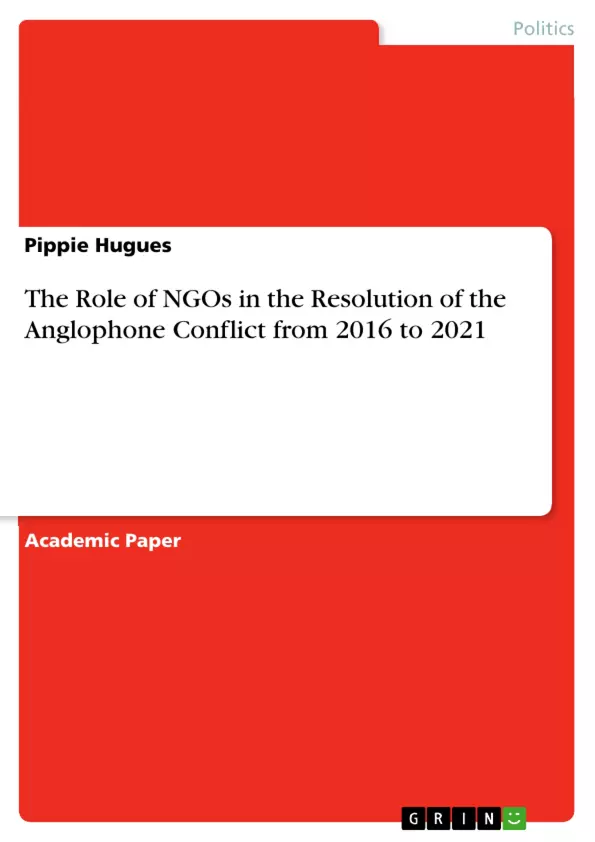This paper is about the role of NGOs in the resolution of the Anglophane conflict. The gruesome and perpetual violation of human rights in Cameroon is alarming and a call for concern especially from 2016 to 2021 during the ongoing Anglophone conflict. The government has tried to curb human rights violation in the country but its measures seem ineffective. This has caused the researcher to investigate the role played by Non Governmental Organisations (NGOs) in the resolution of the ongoing conflict. A detailed study and interviews done on the activities of some selected NGOs who have been very active in monitoring, documenting and reporting issues of the conflict was carried out.
Inhaltsverzeichnis (Table of Contents)
- Introduction
- The Legal Justification for NGO's to Resolve Conflict
- The Role of NGOs in Conflict Resolution
- Protection
- Monitoring and Early Warning
- Advocacy and Public Communication
- Socialization
- Social Cohesion
- Intermediation and Facilitation
- The Role of NGOs in the Anglophone Conflict
- The Center for Human Rights and Democracy in Africa (CHRDA) and the resolution of the Anglophone Conflict
- Justice and Peace Commission (JPC) and the Resolution of the Anglophone conflict
- The Role of the Church
- The International Community
Zielsetzung und Themenschwerpunkte (Objectives and Key Themes)
This work investigates the role of Non-Governmental Organisations (NGOs) in resolving the ongoing Anglophone conflict in Cameroon from 2016 to 2021. The primary objective is to analyze the contributions of selected NGOs to conflict resolution, particularly their efforts in monitoring, documenting, and reporting human rights violations. The paper aims to highlight the challenges faced by these NGOs and propose policy recommendations to enhance their effectiveness.
- The legal framework supporting NGO involvement in conflict resolution.
- The diverse roles of NGOs in conflict resolution, including protection, monitoring, advocacy, and peacebuilding.
- The specific activities of NGOs in the Anglophone conflict, including their impact on human rights and peace efforts.
- The challenges faced by NGOs in operating within conflict zones.
- Policy recommendations for strengthening the role of NGOs in conflict resolution.
Zusammenfassung der Kapitel (Chapter Summaries)
- Introduction: This chapter provides a general overview of the Anglophone conflict in Cameroon and highlights the importance of peace in contemporary Cameroon. It discusses the historical context and the devastating effects of the conflict on the country.
- The Legal Justification for NGO's to Resolve Conflict: This chapter examines the legal basis for NGO involvement in conflict resolution, drawing from the Charter of the United Nations and other international instruments. It discusses the growing role of NGOs as mediators, advisors, and peacebuilders.
- The Role of NGOs in Conflict Resolution: This chapter explores the multifaceted role of NGOs in conflict resolution. It examines their contributions in areas such as protection, monitoring, advocacy, socialization, social cohesion, and intermediation.
- The Role of NGOs in the Anglophone Conflict: This chapter focuses on the specific contributions of NGOs to resolving the Anglophone conflict. It examines the activities of various organizations involved in monitoring, reporting, and advocating for human rights.
- The Center for Human Rights and Democracy in Africa (CHRDA) and the resolution of the Anglophone Conflict: This chapter provides a case study of CHRDA, an NGO actively involved in the Anglophone conflict. It examines its activities, achievements, and challenges.
- Justice and Peace Commission (JPC) and the Resolution of the Anglophone conflict: This chapter presents another case study, focusing on the Justice and Peace Commission (JPC) and its role in resolving the Anglophone conflict.
- The Role of the Church: This chapter explores the role of the church in resolving the Anglophone conflict, highlighting its potential as a mediator and peacebuilder.
- The International Community: This chapter examines the involvement of the international community in the Anglophone conflict, highlighting the roles of various actors and their contributions to conflict resolution.
Schlüsselwörter (Keywords)
The main keywords and focus topics of this work include: Anglophone conflict, Cameroon, NGOs, human rights violations, conflict resolution, peacebuilding, advocacy, monitoring, reporting, mediation, policy recommendations, international law, Charter of the United Nations, CHRDA, JPC, church, international community.
Frequently Asked Questions
What is the focus of this research paper?
The paper investigates the role of Non-Governmental Organisations (NGOs) in resolving the Anglophone conflict in Cameroon between 2016 and 2021.
Which specific NGOs are used as case studies?
The study focuses on the Center for Human Rights and Democracy in Africa (CHRDA) and the Justice and Peace Commission (JPC).
What roles do NGOs play in conflict resolution?
NGOs contribute through protection, monitoring and early warning, advocacy, public communication, social cohesion, and intermediation.
What is the legal basis for NGO involvement in conflicts?
The research draws legal justification from the Charter of the United Nations and other international instruments that support NGOs as mediators and advisors.
What role does the church play in the Anglophone conflict?
The paper explores the church's potential as a mediator and peacebuilder within the context of the ongoing crisis in Cameroon.
What are the main challenges faced by these NGOs?
NGOs face significant challenges operating within active conflict zones, including difficulties in documenting human rights violations and ensuring the safety of their personnel.
- Citation du texte
- Pippie Hugues (Auteur), 2021, The Role of NGOs in the Resolution of the Anglophone Conflict from 2016 to 2021, Munich, GRIN Verlag, https://www.grin.com/document/1150807



